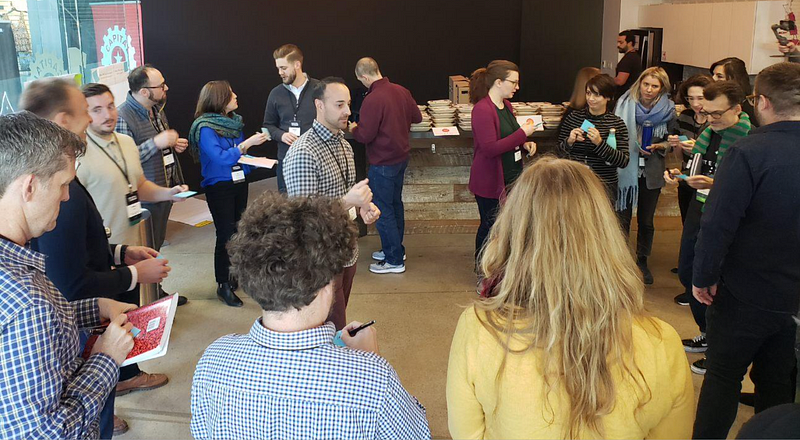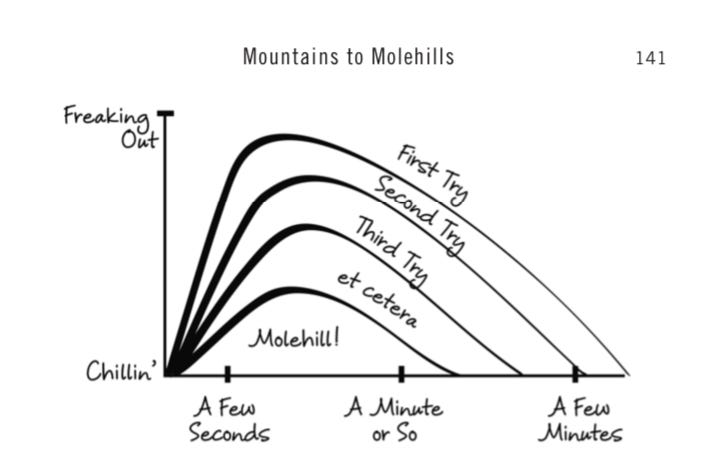Not introversion, but anxiety

Rumbling with discomfort to discover my most meaningful work as an Innovation Designer and Facilitator.
Last night was so peaceful. I stood alone in an empty room — my canvas for tomorrow’s workshop. The quiet inviting me to silently redesign the space in my head — from isolating and uninspiring, to collaborative and energizing. I buzz with anticipation. A couple hours later, the space is transformed. I think, tomorrow will be the best workshop I’ve led yet.
But this morning, as I enter the same space and flick on the lights, my excitement is quickly overrun with panic. Soon, 40 people will fill the room. 40 customers, who paid to learn from me and become inspired. I’m racked with guilt, convincing myself that there are others smarter than me, more experienced, and better able to handle the role of facilitator.
I bring my hands up to my hips, thrust my head back, exhale, and ask myself — as I do right before every workshop — ‘Why do I do this to myself?!’
Moments before I summon everyone’s attention, my heart pounds too loudly to hear myself think. I consider appointing a stranger to run the session, fawning an emergency that requires my attention… somewhere… anywhere other than here. Instead, I calmly raise my hand and wait. One by one, others in the room notice me, hand hanging in the air. They mimic me until the entire room has shifted from a vibrant roar to a humming silence. I smile and begin.
That night, over drinks, 1 of the attendees approaches me, shakes my hand, and says:
I really appreciated how today went and the way you led us, Jay. But, I have to ask, are you an introvert?
A forgiving smile imparts her face. It was hardly the first time I’d been asked that question. But each time I felt an increasing hint of defensiveness creep up, as if my suspicion of being found out was around the corner.
I answer, ‘I am.’ She remarks, ‘Me too! It’s really inspiring to see you up there. I hope I have the courage to do the same one day…’
While it was warming to be seen and acknowledged, I didn’t feel any more certain that my next workshop would be any less stressful.
What’s wrong with me?
The truth is, I’ve been clashing against this pattern since I was a kid. Of course, at 7 years old I wasn’t facilitating workshops, but I was being asked to share my ideas with others.
One of my most embarrassing moments came during college. At the end of one of my electives — Modern & Contemporary Literature — each student was to recite a poem they had written and share the meaning behind it. I decided to calm my nerves by drinking a few beers before class. I also wore my roommate’s glasses so that I focused more on squinting than being present at the front of the class. My plan completely backfired. A few sentences into my poem, I had to stop and take the glasses off so I could see the words. Fumbling with the glasses, my notes fell to the floor. If one of my classmates hadn’t been paying attention up until that point, they definitely were now.
And so lately, hoping to avoid recurring incidents like that one, I’ve grown determined to better understand what happens inside my head and body when wrestling with the fear of contributing my ideas to a captive audience. Chalking it up to introversion didn’t feel right and certainly wasn’t helping — sometimes, I felt even worse.
Mind you, I’ve already done a ton of related work, on myself and with coaches. That work laid the foundation for me to be ready and willing to understand this fear, and walk toward it rather than stuffing it down.
While reading and researching topics around introversion, I found the book, How to Be Yourself: Quiet Your Inner Critic and Rise Above Social Anxiety, by Dr. Ellen Hendriksen. I emboldened the last part because my gut reaction when reading the title was, ‘Anxiety?! I don’t have anxiety!’ Of course, I knew that was actually my fear talking — afraid of what I might discover about myself…
At 43 years old, I think it’s rare we have the opportunity to discover completely new parts of our true selves. And yet, this book has taught me more about myself than just about anything else I’d learned since childhood. Most importantly, to help me unpack the differences and critical misunderstandings between introversion and social anxiety.
Introversion vs. social anxiety
Social anxiety is learned
In most cases, social anxiety is rooted in a single, traumatizing event we experienced — often during childhood. Afterward, our brain goes to work, protecting us from experiencing that pain again.
If you’re like me, you may have assumed that social anxiety is something you’re born with — it’s just who you are. In reality, your brain has learned to generate your anxiety as a defense mechanism against that one moment in time. Since that moment, you’ve spent countless cycles perpetuating that anxiety to protect yourself from that moment happening again — from the threat of being revealed.
This explains why our face turns all shades of red, why we start sweating, our heart thumps, and our voice trembles. We’re racked with panic that our audience will see through our veil. That we’ll be found out. That they’ll, somehow, be able to peer inside our head to that moment of terror so many years ago.
The fear of being revealed, then, is that others will find out we’re not who we say we are. That we’re a fraud. That we’re not the adult they see standing at the front of the room, on the stage, or up at the whiteboard — the person they’re here to give their time and attention to. Instead, we’re that intimidated child — afraid to be seen screwing up again.
And so we train ourselves to be socially anxious. It’s a practice we’ve learned and become vigilant of. Introversion, on the other hand, is innate.
For the first time in my life, I’ve come to understand that I’m not an introvert. I’m not a full-blown extrovert. I’m somewhere in between — an ambivert intent on overcoming social anxiety. If that sounds like you, we make up a small percentage of the world — roughly 9%. Let’s go a little bit deeper to explore what we’re experiencing.
Experiencing social anxiety as an extrovert / ambivert
Please keep in mind, I’m not claiming to know what it’s like to have severe anxiety — mine is mild to moderate. I’m also not claiming to be an expert, a sociologist, or a psychiatrist. I’m only sharing what I’ve learned so far, based on my experience.
For true introverts (without social anxiety), solitude feels good. Solitude recharges you. For extroverts / ambiverts (EAs) with social anxiety, solitude feels less anxious. But ultimately, we feel lonely and disconnected.
To put this in perspective, think about being invited to an intimate dinner party at a trendy new restaurant in the city. As an introvert (especially one who’s comfortable setting boundaries), there’s a good chance you’ll opt out. That’s just not your scene. As an EA, you’re initially excited at the thought of such a vibrant atmosphere, but as the evening approaches, your fear of having to perform overruns you. It’s like living in a constant duality — wanting what we know triggers us most.
Performing and perfectionism
I keep talking about ‘performing.’ What do I mean? If you’re a facilitator, trainer, speaker, corporate executive, or public figure, you’re acknowledged for your expertise but you are loved for your performance — whatever that means to you and how you manifest it.
Truth is, it’s not sharing our expertise that we fear, but the performance surrounding it. That’s why we’re brilliant designing our keynote, but a sweaty mess standing backstage. Because social anxiety thrives on perfectionism. Our performance will be delivered with flawless execution, or in spectacular failure. We nail it or we bomb. The perfectionist in us is a ruthless critic.
On the other hand, for introverts, their performance isn’t the criteria they use to evaluate whether they’ll join the group or not. Their only consideration is if they want to deal with the ensuing physical and mental toll it will take on them. If they do show up, they will perform as they always do, without all of the self-judgement.
To summarize, the difference between introversion and social anxiety is best quoted by Dr. Hendriksen herself:
Introversion is your way.
Social anxiety, gets in your way.
Overcoming social anxiety
First, if any of this resonates with you, I can’t recommend Dr. Hendriksen’s book enough. She shares tools and strategies, along with examples to help contextualize. Some of the practices you may be doing already, some may be new. Some will land with you, some not so much. It’s not an all or nothing offensive — apply what works for you.
Here are the top 3 pieces I’ve been experimenting with and incorporating, slowly and steadily.
You’re already ready
If the thought of striking up a conversation with a stranger at the gym or grocery story scares the living hell out of you — you’re not alone. It’s our resistance to take that leap, when we’re not confident, that makes us anxious — not the act itself. We’re not going to be confident enough to do something scary. We’re going to do something scary which will build our confidence. And in the meantime, we need to fake it till we make it.
The good news is, your confidence will grow as you observe yourself taking risks and surviving them. And with each attempt, your resistance will drop a little bit more.
Start first, iterate later
As a perfectionist, you might trick yourself into waiting until you’ve identified the perfect opportunity, conversation, or event to begin combatting your social anxiety. You may be afraid that if you f*ck it up, you won’t try again — you fear being afraid. Understandable, but also unnecessary.
Start simple. If you break out in a cold sweat thinking about presenting a TED Talk, save that one for later. Start by initiating a conversation with someone at Staples who’s also hemming and hawing over 3x3 vs 3x5 post-its (facilitator humor). Then move on to the next thing on your list that’s marginally scarier — Dr. Hendriksen refers to this as your Challenge List.
Keep in mind, the things far out on your challenge list that intimidate you today, may not be so daunting by the time you get to them. All of your small wins today will build your confidence.

It’s getting started that’s most intimidating. It gets easier over time. Action builds confidence. Exciting, isn’t it?
Watch yourself
We all have this picture in our heads of what we must look like in our darkest moments of rumbling with social anxiety… Up in the front of the room, doing weird shit with our hands, voice crackling, our face looking as if we’d just swallowed a handful of Ghost Peppers.
Here’s what really happens. One person in the crowd pauses for a moment from taking notes. They look up for a split second, notice a few beads of sweat along your hairline, and then immediately get distracted thinking about what they’re gonna feed the kids for dinner.
We actually aren’t the center of everyone else’s universe. Hard to believe, until we see for ourselves what we actually look like up there…
Next time you’re getting ready to facilitate, speak, or otherwise perform, record yourself. Or better, ask a friend to do it — you’ll have their pictures and videos, along with their feedback on how you did. You’ll most likely be shocked at how unobservable your anxiety was. You might just be proud of yourself.
Full transparency: Since December of 2018 I’ve been promising myself that I’ll watch a talk I gave to a house full of people at a Christmas party. I just haven’t gotten around to it. Be patient with yourself, and remember to fight through the awkwardness of hearing your own voice. Unless you’re a psychopath, none of us enjoy the sound of our own voice.
Doing what we fear
As I’ve learned from the greats like Brené Brown, living a full life requires us to choose courage over comfort. I could have chosen 300 other professions that allowed me to remain small — keeping my fears from being revealed.
Instead, my path led me to facilitating design thinking inspired workshops, where my job is to design experiences that allow for groups of people to trust, communicate, create, and decide. Aside from being an actor or running for office, this role continually pushes me to my edge. I’m constantly uncomfortable and yet just as continually proud of the things I push myself, and the people I’m working with, to try.
And so my hope in sharing this piece is to moves others — you — to action. Social anxiety is not you. It’s something you learned. That means it’s also something you can unlearn. There are rooms of people waiting to hear your ideas. Get out of your own way so you can start sharing them.
Why I wrote this
In a world that myopically glamorizes success stories, sharing the thing I fear most and yet also get paid to do was not an easy decision to arrive at. I’ve been sitting on this article for months, maybe years. But grappling with social anxiety is isolating. The only thing that makes it worse, is keeping it to yourself.
I wrote this to work through my own pluses and deltas. I also wrote it to find and build community with others. If you have a related story, I would so appreciate hearing it. If you’re not ready to share publicly, send me a message. Otherwise, if you feel like feeding yourself and others reading this, share it in the comments. Or do both!
Additional reading:
The Courage to Be Disliked, by Ichiro Kishimi and Fumitake Koga
Already Free, by Bruce Tift MA
The Happiness Advantage, by Shawn Achor


